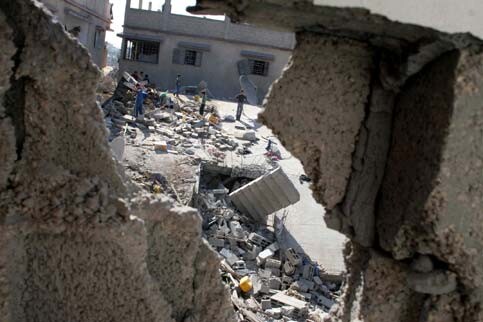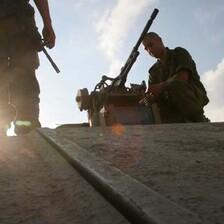Palestine 18 August 2006

Palestinians inspect a demolished building after an Israeli air strike in Khan Younis in the southern Gaza Strip, in which two people were killed and four wounded, August 16, 2006. (MaanImages/Hatem Omar)
[ed. note: “Summer Rains” is the name the Israeli military has given to their ongoing operation in Gaza]
In wintertime, we are used to having heavy rains sometimes in some places, while in other places nearby, there is no rain at all. You know why, simply because a cloud might be somewhere else.
In Palestine, our climate is arid, dry - normally we only have rain in winter. But this summer, for the first time ever, we have been experiencing “summer rains”. Since June 27, they have been falling very heavily, with a few brief pauses when the cloud moved north to Lebanon, a region with a climate very similar to Gaza.
Though the two areas, Palestine and Lebanon, have both had a unique summer this year, now the rains in Lebanon have completely stopped, and people who fled the floods, started to get back to their damaged homes, trying to fix what could be fixed.
However, this very dark cloud has moved back to Palestine, where people had just begun to lift their heads after the first deluge. Soon after the return of the cloud of “summer rains” to Gaza, at least 14 Palestinians were wounded under the rubble of their homes in the northern Gaza Strip refugee camp of Jabalya, when it was hit by the latest “summer rains”.
In Lebanon today, the sun has started to rise over the cloud again, with people rushing to their battered homes in large numbers, while the sun in Palestine has disappeared again, with the rain now hitting everywhere, even people huddled in their homes around candlelight — for the rains falling there have already caused the electricity to be cut.
The rains of this summer on both Palestine and Lebanon are not unique because they are rains falling in a desert climate, but rather because the raindrops are manufactured by the most sophisticated army in the region, the Israeli occupation army. (The Israeli army’s ongoing attacks on the Gaza Strip are codenamed ‘Operation Summer Rains.’)
Rains that are made of tank bombs, missiles from warplanes and heavy bullets, rains that are not merciful, like rains made of water; these rains never differentiate between families, elderly and children, houses, businesses, institutions, water pumping stations and electricity plants; everything is torn apart as these rains fall on Gaza.
At any rate, the rains in Palestine, namely in the Gaza Strip, have come back as heavily as when they started on June 27, while the sun has risen again in Lebanon after the international community made a big umbrella that covered that area. Now, will this umbrella extend to neighboring Palestine, or will we Palestinians continue to have to endure this endless summer of Israeli rainfall on our heads?
Rami Almeghari is currently a Senior Translator at the Translation Department of the Gaza-based State Information Service (SIS) and former Editor in Chief of the SIS-linked International Press Center’s English site. He can be contacted at rami_almeghari@hotmail.com
Related Links





